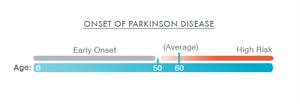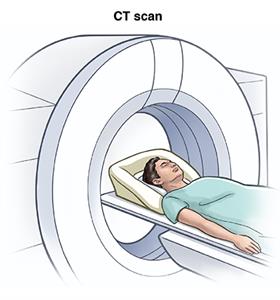Parkinson's Disease
People with Parkinson’s disease experience difficulty walking, tremors, and may develop cognitive problems, including memory loss and dementia. It is a progressive movement disorder that causes muscles to tighten and become rigid overtime. Parkinson’s disease is difficult to diagnose, especially at its onset, because is often shares similar symptoms with other movement disorders.
Saint Luke’s Movement Disorders Program offers a comprehensive approach to patients with Parkinson’s disease. Combining a clinical visit with advanced imaging such as MRI and DaTscan™ Spectroscopy, our movement disorders neurologists and neurosurgeons work together to diagnose and treat patients. DaTscan provides detailed images of dopamine activity within the brain, which helps us differentiate between various similar conditions.
Following an accurate diagnosis, Saint Luke’s provides Parkinson's patients with a full range of medical, surgical, and rehabilitation options, including asleep deep brain stimulation (DBS) surgery. We are one of the few hospitals in the nation to pioneer and provide this surgery while the patient is asleep.
What is Parkinson disease?
Parkinson's disease is a movement disorder. It can cause the muscles to tighten and become rigid This makes it hard to walk and do other daily activities. People with Parkinson’s disease also have tremors and may develop cognitive problems, including memory loss and dementia.
Parkinson's disease is most common in people who are older than 50. The average age at which it occurs is 60. But some younger people may also get Parkinson's disease. When it affects someone younger than age 50, it's called early-onset Parkinson's disease. You may be more likely to get early-onset Parkinson's disease if someone in your family has it. The older you are, the greater your risk of developing Parkinson's disease. It's also much more common in men than in women.
Parkinson's disease is a chronic and progressive disease. It doesn't go away and continues to get worse over time.
What causes Parkinson disease?
Parkinson's disease arises from decreased dopamine production in the brain. The absence of dopamine makes it hard for the brain to coordinate muscle movements. Low dopamine also contributes to mood and cognitive problems later in the course of the disease. Experts don't know what triggers the development of Parkinson's disease most of the time. Early onset Parkinson's disease is often inherited and is the result of certain gene defects.
What are the symptoms of Parkinson disease?
Parkinson's disease symptoms usually start out mild, and then progressively get much worse. The first signs are often so subtle that many people don't seek medical attention at first. These are common symptoms of Parkinson's disease:
- Tremors that affect the face and jaw, legs, arms, and hands
- Slow, stiff walking
- Trouble maintaining balance
- Problems with coordination
- A stiff feeling in arms, legs, and torso area
- Changes in handwriting
Eventually, Parkinson's disease symptoms get worse and include:
- Depression
- Gastrointestinal problems (like constipation)
- Problems with urination
- Trouble chewing and swallowing food
- Memory loss
- Hallucinations
- Dementia
- Weight loss
How is Parkinson disease diagnosed?
Parkinson's disease can be hard to diagnose. No single test can identify it. Parkinson can be easily mistaken for another health condition. A healthcare provider will usually take a medical history, including a family history to find out if anyone else in your family has Parkinson's disease. He or she will also do a neurological exam. Sometimes, an MRI or CT scan, or some other imaging scan of the brain can identify other problems or rule out other diseases.
How is Parkinson disease treated?
Parkinson's disease can't be cured. But there are different therapies that can help control symptoms. Many of the medicines used to treat Parkinson's disease help to offset the loss of the chemical dopamine in the brain. Most of these medicines help manage symptoms quite successfully.
A procedure called deep brain stimulation may also be used to treat Parkinson's disease. It sends electrical impulses into the brain to help control tremors and twitching movements. Some people may need surgery to manage Parkinson's disease symptoms. Surgery may involve destroying small areas of brain tissue responsible for the symptoms. However, these surgeries are rarely done since deep brain stimulation is now available.
What are the complications of Parkinson disease?
Parkinson's disease causes physical symptoms at first. Problems with cognitive function, including forgetfulness and trouble with concentration, may arise later. As the disease gets worse with time, many people develop dementia. This can cause profound memory loss and makes it hard to maintain relationships.
Parkinson's disease dementia can cause problems with:
- Speaking and communicating with others
- Problem solving
- Understanding abstract concepts
- Forgetfulness
- Paying attention
If you have Parkinson's disease and dementia, in time, you likely won't be able to live by yourself. Dementia affects your ability to care of yourself, even if you can still physically do daily tasks.
Experts don't understand how or why dementia often occurs with Parkinson's disease. It’s clear, though, that dementia and problems with cognitive function are linked to changes in the brain that cause problems with movement. As with Parkinson's disease, dementia occurs when nerve cells degenerate, leading to chemical changes in the brain. Parkinson's disease dementia may be treated with medicines also used to treat Alzheimer's disease, another type of dementia.
Can Parkinson disease be prevented?
Experts don't yet understand how to prevent Parkinson's disease. In some instances, there seems to be a genetic predisposition to develop Parkinson's disease, but this isn’t always the case. Research is underway to find new ways to treat and prevent the disease.
Living with Parkinson disease
These measures can help you live well with Parkinson's disease:
- An exercise routine can help keep muscles flexible and mobile. Exercise also releases natural brain chemicals that can improve emotional well-being.
- High protein meals can benefit your brain chemistry
- Physical, occupational, and speech therapy can help your ability to care for yourself and communicate with others
- If you or your family has questions about Parkinson's disease, want information about treatment, or need to find support, you can contact the American Parkinson Disease Association.
When should I call my healthcare provider?
Call your healthcare provider if you or your loved one notices a sudden or significant change in symptoms or if mood changes, increased symptoms of depression or feelings of suicide develop.
Key points about Parkinson disease
- Parkinson's disease is a movement disorder that can make your muscles tight and rigid.
- It can make walking and taking care of yourself difficult.
- It can lead to problems such as depression, hallucinations, and dementia.
- Parkinson's disease will progress but medicines can help with some symptoms.
Next steps
Tips to help you get the most from a visit to your healthcare provider:
- Know the reason for your visit and what you want to happen.
- Before your visit, write down questions you want answered.
- Bring someone with you to help you ask questions and remember what your provider tells you.
- At the visit, write down the name of a new diagnosis, and any new medicines, treatments, or tests. Also write down any new instructions your provider gives you.
- Know why a new medicine or treatment is prescribed, and how it will help you. Also know what the side effects are.
- Ask if your condition can be treated in other ways.
- Know why a test or procedure is recommended and what the results could mean.
- Know what to expect if you do not take the medicine or have the test or procedure.
- If you have a follow-up appointment, write down the date, time, and purpose for that visit.
- Know how you can contact your provider if you have questions.

